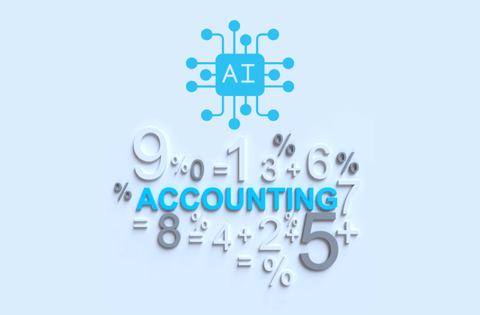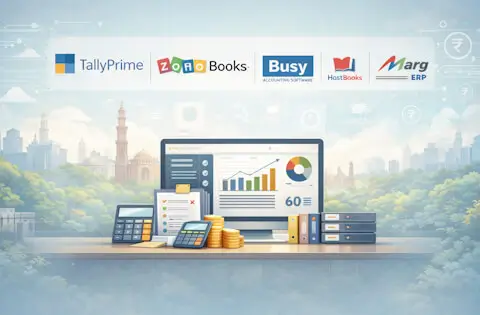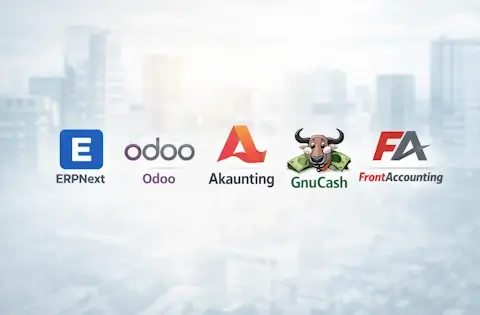The 5 Best AI Accounting Software for Small Business

The software for accounting and AI accounting software models have only one big distinction between them.
AI is a learning machine and therefore accounting with AI observes you and your business behavior to predict the future of your business which the other doesn’t.
AI accounting software is predictive while cloud based accounting software is only real-time and has no learning model to predict future behavior.
And that is what AI accounting software is all about.
It is transforming the way businesses manage their finances by offering automated solutions for tracking income, expenses, and other financial data.
Businesses of all sizes are now leveraging the power of artificial intelligence (AI) to streamline their accounting processes.
Thus AI accounting is quickly becoming the go-to solution for companies looking to save time and money.
With it, businesses can automate tedious tasks such as invoicing, budgeting, and managing payroll.
They can access real-time analytics and insights into their financial performance to make better decisions about managing their money.
AI accounting software also offers advanced features such as fraud detection and predictive analysis that help businesses stay ahead of potential issues before they become a problem.
This helps them avoid costly mistakes while providing greater accuracy in their financial reporting.
What is AI-Based Accounting Software?
AI accounting utilizes advanced algorithms to automate many aspects of the financial process, making it easier for businesses to track their finances.
Where AI-Based accounting is the use of artificial intelligence and machine learning to automate basic accounting and bookkeeping tasks such as categorizing expenses, reconciling bank accounts, forecasting cash flow, and detecting possible fraud.
This means the system uses advanced algorithms to analyze financial data, accurately predicting future trends and giving you invaluable insight into your financial health.
With real-time alerts for potential issues, it helps keep your business on track with minimal effort required from you.
Therefore this type of software can save time and help provide insights that would have been difficult to obtain from manual processes.
AI accounting software collects data from different sources such as invoices, bills, receipts, financial statements, and more.
It then analyses this data using machine learning algorithms to accurately identify patterns in the data which can be used for a wide range of applications such as budgeting decisions and cost optimization.
The AI-powered system also integrates with other popular accounting systems to make it easy for accountants to access all their financial information in one place.
Thus It enables businesses to better understand their financial standing so they can make informed decisions about their budget and investments.
Why Invest in AI Accounting Software?
AI-based accounting software is a new breed of accounting software that uses artificial intelligence to automate and streamline various accounting tasks.
These systems use machine learning algorithms to analyze financial data and provide insights and recommendations for better decision-making.
These include increased efficiency and accuracy, reduced manual errors, real-time data analysis and insights, and the ability to automate repetitive tasks.
AI accounting software systems also help businesses save time and resources while providing a more comprehensive view of their financial situation.
However, some of the major reasons why businesses invest in AI Accounting are
- AI Accounting software helps to streamline and automate repetitive tasks
- It reduces manual errors, leading to increased efficiency and accuracy
- AI-based accounting software provides valuable insights to support informed decision-making
- Performs automated data entry, reconciliation, and reporting
- Saves time and allows for quicker turnaround on financial reports
- Advanced AI-powered security features detect and prevent fraud in real time
- AI can analyze and interpret financial data, identify patterns, and provide actionable insights
- It also provides enhanced security and better customer services
- Having an AI system in place automatically detects and corrects mistakes
- AI technology helps streamline data entry while eliminating costly errors and improving overall accuracy
- AI-based software also offers users enhanced insights into their financial trends through advanced analytics capabilities
- Enables businesses to quickly identify fraud or any discrepancies in billing records, helping them protect themselves against potential losses
- It uses machine learning algorithms to automate mundane tasks, allowing businesses to save valuable time and resources
- Reduces costs by eliminating the need for manual labor, reducing labor costs, and increasing cost-effectiveness
Common Use Cases of AI-Based Accounting Software
There are a number of common use cases for AI-based accounting software.
However, one of the most useful applications of AI in accounting is automated data entry.
By automating the tedious process, businesses can save time and increase accuracy when entering data into their systems.
AI-powered data entry can help to reduce errors in accounts payable or receivable, providing an additional layer of protection against costly mistakes.
Another popular use case for AI accounting software is fraud detection.
The technology uses natural language processing (NLP) algorithms to monitor transactions and detect suspicious activity within accounts quickly and efficiently.
Apart from these, there are many other potential use cases for AI-based accounting software. Some common uses include:
- Managing and tracking expenses
- Payroll processing and management
- Managing inventory
- Automating accounting processes
- Improving business efficiency
- Enhancing customer service
- RPA automated orders to cash and procure to Pay life cycles
- Bank Reconciliation statement
- Account Reconciliation
- Closing of accounts
- Financial Auditing
- Generating reports and insights
- Automated bookkeeping and financial reporting
- Predictive cash flow forecasting
- Invoice processing and payment management
- Fraud detection and prevention
- Tax compliance and filing
- Budget planning and expense management
- Accounts payable and receivable management
- Auditing and internal controls
- Customer relationship management and sales analysis.
Challenges Associated with Implementing and Utilizing AI In Accounting
There are a few challenges associated with implementing and utilizing AI accounting software.
Some of the common challenges are:
- Implementing AI-based accounting software can be expensive and may require a significant upfront investment
- Implementing and utilizing AI software requires specialized technical knowledge and resources, which can be a challenge for small and medium-sized businesses
- The accuracy of AI software depends on the quality of the data it is fed, so it is important to ensure that the financial data being used is complete and up-to-date.
- Integrating AI software with existing accounting systems can be complex and time-consuming
- Employees may resist the adoption of AI-based software due to the fear of job loss or a perceived lack of control over financial data
- AI-based accounting software may raise concerns about privacy and data security and may require companies to comply with new regulations
- AI algorithms are only as unbiased and accurate as the data they are trained on, so it’s important to ensure that they are trained on diverse and representative data sets.
Common AI Accounting Software Features
Integration of AI with business accounting software provides advanced predictions into financial analysis to reduce and avoid errors.
Here are some of the common features of AI-based accounting software:
- Predictive analytics and forecasting capabilities provide advanced insights into future financial performance
- NLP capabilities to automate financial data analysis, categorization, and entry
- Machine learning algorithms automatically categorize and analyze financial data
- Real-time data analysis and visualization tools to monitor financial performance
- Automated audit and compliance tools to ensure accuracy and adherence to financial regulations
- Virtual assistance for tasks such as expense reporting, invoice processing, and data entry
- Personalized financial recommendations and advice based on AI analysis of past performance
- Enhanced fraud detection, including real-time alerts, anomaly detection, and behavioral analysis
- Cash flow management tools to monitor and optimize cash flow
- Predicts future cash balances and minimizes financial risk
- Integrations with other popular accounting tools streamline financial processes
Which AI-Based Accounting Software is Right For My Company?
Here are some factors to consider when choosing AI-based accounting software for your company:
- Consider your company’s specific financial needs and requirements, such as invoicing, expense tracking, and financial reporting.
- Consider your company’s budget and the cost of implementation and ongoing maintenance.
- Ensure that the AI-based software you choose can integrate with your existing accounting and financial systems
- Choose software that is easy to use and has a user-friendly interface for employees.
- Consider the level of customer support offered by the software vendor and the resources available to help with implementation and ongoing use
- Choose software that meets industry security and privacy standards and complies with regulations such as GDPR and HIPAA.
- Research the reputation of the software vendor and the AI-based software, looking for positive reviews from other users and customers
- Consider if the software can be customized and scaled to meet your company’s evolving financial needs
The 5 Best AI Accounting Software on the Market
Here are our Top 5 Best AI Accounting Software picks for all businesses and enterprises:
1. Gridlex Sky

Gridlex Sky is an AI accounting software developed by Gridlex.
This AI-based Accounting Software is cloud-based and uses artificial intelligence (AI) technology to make financial processes more efficient.
This software is designed to help businesses manage their finances better and make smarter decisions with an intuitive interface and advanced analytics capabilities.
It can automate processes such as invoicing, credit control, reconciliation, budgeting, and forecasting, making it easier for companies of any size to improve their financial health.
The AI accounting software from Gridlex has inbuilt AI-driven financial advisers such as an AI profit advisor, AI revenue advisor, AI expense advisor, and AI inventory advisor that aids in controlling and streamlining the day-to-day activities of businesses.
It provides an automated and efficient solution for many of the tedious tasks associated with bookkeeping, such as data entry, invoice reconciliation, and reporting.
With Gridlex’s intuitive user interface, users can easily manage their finances with minimal effort. The AI component of Gridlex enables users to access sophisticated analytics that simplifies decision-making.
Using predictive models, helps users identify potential problems before they become major issues, giving them more time to focus on other areas like expanding their business or growing their client base.
In addition to offering comprehensive financial reports, Gridlex also provides detailed analysis of customer trends and spending patterns so businesses can make more informed decisions about how to allocate resources.
2. VIC.AI

Vic.ai is an artificial intelligence-powered accounting software that offers autonomous invoice processing, approvals, and PO matching.
The software provides an intelligent dashboard featuring real-time data analytics utilizing data mining processes to improve ROI and offer full control of finances.
It automates and streamlines Accounts Payable and Accounts Receivable processes with repetitive and manual tasks to increase efficiency and accuracy for businesses.
The AI learns from the existing data imitating work performed by your team and thus it gets trained automatically thereby making decisions from millions of stored invoices and thus providing autonomous invoice processing and approvals.
This means the more your team uses the system, the more trained your software becomes, and thus the AI builds its accuracy stronger with time.
The software replaces obsolete OCR and rules-based automation and eliminates manual task-keeping with AI built for autopilot ingesting invoices and automatic approvals being sent.
Via.ai also offers Open API to integrate with popular accounting platforms such as QuickBooks, Sage Intacct, and other ERP systems and can handle tasks such as bank reconciliation, expense categorization, and invoicing.
3. ZENI.AI

Zeni.ai is an artificial intelligence-powered accounting software designed to help small and medium-sized businesses manage their financial operations.
It automates repetitive and time-consuming tasks such as bookkeeping and expense tracking, freeing up time for business owners to focus on growth and strategy.
Zeni.ai uses machine learning algorithms to classify transactions, extract data, and generate insights, streamlining the accounting process.
The AI-powered dashboard in Zeni gives you easy access to view your financial data in real time, get insights, and make informed decisions.
It also provides an overview of key financial metrics such as cash flow, expenses, and revenues and uses AI to integrate with all of your revenue sources.
Moreover, it provides a visual representation of data through charts and graphs, making it easy for users to understand their financial health and performance.
The dashboards are customizable and can be configured to show the data that is most relevant to the user.
Additionally, Zeni.ai’s dashboards are updated in real time, providing users with up-to-date information about their financials at all times.
Spot expense trends across the entire business and flag anything that is going wrong.
View and download details of revenue across month quarter and years and access critical reports such as the P&L, balance sheet, and cash flow.
Access important metrics such as Net burn to understand your business expenditure every month and what your runway looks like.
4. Bill & Divvy

BILL is a cloud-based account receivable and payable automation platform that helps businesses and accounting firms streamline their AR/AP processes.
It also offers credit and expense management software known as Divvy From Bill
BILL AI is a machine learning tool that automates the bill-creation process by extracting invoice and vendor information from documents in your inbox.
This saves time and reduces manual entry and potential errors. The AI extracts information including vendor name, invoice number, due date, and payment terms.
It also detects duplicates and warns you to prevent costly mistakes.
However, it does not extract information if it is unreadable and you can fill in any gaps for which customers report saving an average of 50% time on bill pay.
Divvy from Bill is an AI-powered expense management and budgeting software for businesses to automate their financial processes, including expenses, invoicing, and payments.
The platform uses machine learning and natural language processing to automate tasks such as receipt categorization and vendor payment matching.
Divvy expense management software also provides fast and efficient reconciliation and reporting of expenses.
With the Divvy chip card, employees can make purchases, and the expenses are notified in real-time.
The software automatically categorizes transactions matches receipts and generates expense reports.
Divvy budgeting software helps businesses control their spending by setting spending limits and merchant controls tied to employee credit cards.
The software syncs automatically with the cards and offers real-time visibility into spending by department, team, project, or individual budget.
The software offers flexibility by allowing businesses to create multiple budgets for different departments, teams, or projects, and to send and request funds instantly from mobile or desktop devices.
5. Docyt

Docyt is a bookkeeping software that automates tedious bookkeeping tasks, empowers management with real-time financial insights, and offers multi-entity accounting solutions.
It uses artificial intelligence (AI) to learn a business’s operations and automate the back office, providing real-time visibility into expenses, revenue, and profitability.
The software can work in conjunction with QuickBooks, making the coding of transactions, journal entries, and reconciliation of bank and credit card accounts easier.
Docyt is cloud-based, allowing for collaboration and sharing of real-time financial insights from anywhere, anytime.
The software can also improve employee satisfaction by reducing manual tasks.
With Docyt’s powerful AI technology, it learns the user’s business and automates the back office tasks, providing real-time financial insights.
Business owners and accountants can spend less time on bookkeeping and more time on strategic work.
Docyt offers the option of running the software yourself or hiring a dedicated account manager to train the AI.
The software alerts users when action is needed, such as uploading a receipt or categorizing a transaction.
Docyt also provides a multi-functional tool that automates spend management and revenue tracking, AI-powered categorization and reconciliation, and real-time financial reports.
Customers have reported increased organization and simplification of accounting and accounts payable systems, leading to more time spent improving their businesses.
Frequently Asked Questions
1. Can small businesses benefit from AI-powered accounting software?
Yes. AI-driven accounting platforms automate routine tasks like categorizing expenses, detecting anomalies, forecasting cash flow, and even suggesting tax deductions—helping small business owners save time and make smarter decisions.
2. How does AI improve fraud detection in accounting?
AI uses pattern recognition to spot unusual transactions in real time. This helps identify potential fraud much faster than traditional methods, enabling proactive responses.
3. Can AI accounting software handle multiple currencies?
Absolutely. Many AI-enabled solutions support multi-currency transactions, automate exchange‑rate conversions, and simplify international reporting for businesses operating globally.
4. How does AI help with financial forecasting?
AI analyzes historical financial data and market trends to generate accurate cash-flow forecasts and budgets—empowering better planning and resource allocation.
5. Is AI accounting software secure?
Yes. Leading AI accounting systems implement strong security measures like data encryption, multi-factor authentication, SOC‑2 compliance, and regular backups to safeguard sensitive financial data.
6. Does AI replace accountants or enhance their work?
AI acts as a powerful assistant—it saves time on repetitive tasks, flags exceptions, and generates draft reports, but human oversight remains essential for decision-making, audits, and complex financial advice.
7. What should I look for when choosing AI accounting software?
You should be focusing on the following on automation capabilities (bookkeeping, invoicing, forecasting), Integration with existing tools (banking, payroll, CRM), Security and compliance, Scalability and pricing and customer support quality.
Conclusion:
Many other accounting software companies claim to use artificial intelligence (AI) in some way to enhance their products.
However, it’s important to note that AI implementation can vary widely between different accounting software.
Also, the level of AI automation and decision-making can be different, so it’s important to research each product and determine what features are best suited to your business needs.
The goal of AI-based accounting software is to increase efficiency, and accuracy, and provide businesses with the information they need to make informed financial decisions.
AI accounting software can automatically generate balance sheets, income statements, cash flow statements, and other essential documents.
Additionally, the software can help businesses identify errors in their transactions and quickly correct them.
Furthermore, these programs are able to categorize expenses and revenues automatically which simplifies the task of creating reports.
Ultimately, AI accounting software will allow companies to better manage their finances with confidence and speed.
Related Resources:
What is an Accounting System? Accounting Components, Types and Examples
5 Best Open Source Accounting Software for Small Business 2026
What is Accounting: Meaning, Types & Why It Matters
Best Accounting Software in India 2026: Features, Pricing & GST Compliance
7 Ground Challenges of Adopting & Migrating to Cloud Accounting
8 Best Cloud-Based Accounting Packages for Indian SMEs (2026)
Best Accounting Apps Online To Improves Cashflow and Profitability
Top Free Accounting Software Options for India GST
The CAs Tech Stack: 5 Best Accounting Software for CA Firms in India 2026



